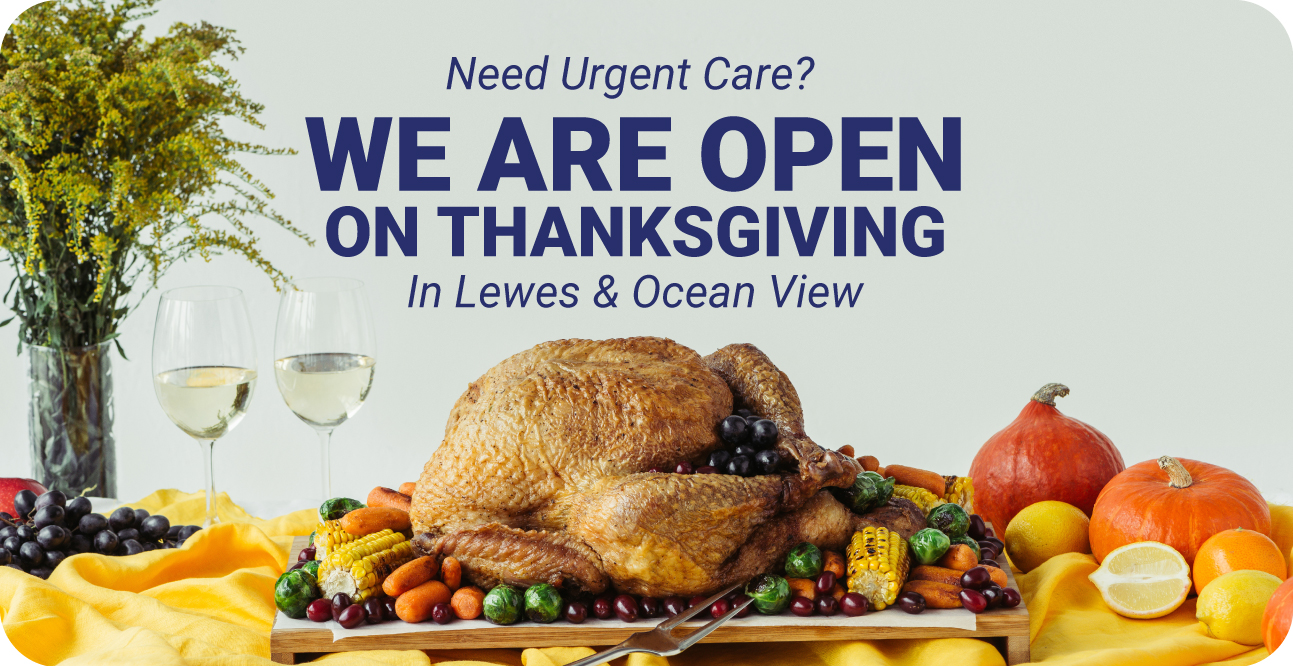Vaccines are safe, highly effective, and they work by training your immune system to respond to disease. This post breaks down why measles cases dropped dramatically after vaccination and why hepatitis B prevention matters—especially for kids—so you can make informed choices.
Why the Holiday Season Raises Heart Failure Risk — And When to Visit Urgent Care
(FYI: We’re Open 365 Days a Year – in Lewes and Ocean View)

The holidays are often filled with joy, family, travel, and celebration — but for many people, especially those managing heart failure, this time of year also brings real health risks. Research shows a measurable rise in heart-related hospitalizations and complications around the Thanksgiving–New Year period. Understanding why this happens can help you stay safe while still enjoying the season.
Why Heart Failure Risk Increases During the Holidays
1. Holiday meals are saltier, heavier, and harder on the heart
From turkey and ham to stuffing, gravy, charcuterie boards, and sweets, holiday meals tend to be high in salt, sugar, and large portions. According to Loma Linda University Health, these changes in diet can trigger fluid retention, raise blood pressure, and place extra workload on the heart — especially in people with heart failure or at risk of it.
Source: Loma Linda University Health
2. Heart failure hospitalizations increase immediately after major holidays
A study published in the Journal of Cardiac Failure found that daily admissions for heart failure increased in the days right after Christmas Day — specifically during the four days following the holiday — compared with the rest of the month.
3. Patients often relax their medical routines during the holidays
The same review from Loma Linda University Health notes that the holidays are a common time for “decompensated heart failure” — when the heart can no longer keep up with the body’s needs. Common reasons include:
- Eating more salt than usual
- Drinking more alcohol
- Skipping medications
- Travel or changes in routine
- Reduced physical activity
Even short-term changes in habits can create a dangerous buildup of fluid and pressure in the body.
Source: Loma Linda University Health
4. Cardiovascular mortality rises at the end of the year
Research has shown about a 4% increase in deaths from cardiovascular and other natural causes during the Christmas and New Year period compared to expected numbers.
Source: Observatoire de la Prévention
When to Visit Urgent Care for Heart Failure–Related Concerns
During the holidays, your primary care provider or cardiologist may be harder to reach, offices may be closed, or you may be traveling away from home. Atracare Urgent Care is open throughout the holiday season, including Thanksgiving, to evaluate symptoms and determine whether you need additional care.
Seek urgent evaluation if you or a loved one experiences:
- Sudden shortness of breath, even at rest or with minimal exertion
- New or worsening swelling of the legs, feet, or abdomen
- Rapid weight gain: 2–3 lbs in a day or 5+ lbs in a week
- Persistent cough, especially pink or frothy sputum
- Feeling faint, dizzy, or unusually fatigued
- Chest tightness or new palpitations
- Symptoms that feel “off,” but you’re unsure
- Trouble reaching your cardiologist or uncertainty about whether symptoms can wait
At Atracare, we can:
- Run EKGs
- Check vitals and oxygen levels
- Evaluate for fluid overload
- Assess shortness of breath, chest discomfort, or swelling
- Provide guidance and referrals if higher-level care is needed
Delaying care during a heart failure flare-up can make the situation worse and lead to longer hospital stays or preventable complications.
Keeping Your Heart Safe This Holiday Season
You don’t need to avoid holiday celebrations — just approach them mindfully:
- Eat salt-heavy foods in moderation
- Drink alcohol sparingly
- Take medications as prescribed, even when traveling
- Stay hydrated
- Avoid large meals late at night
- Take short walks after eating
- Listen to your body and don’t ignore warning signs
If something doesn’t feel right, Atracare is here for you — including on Thanksgiving and throughout the holiday season.
0 New comments